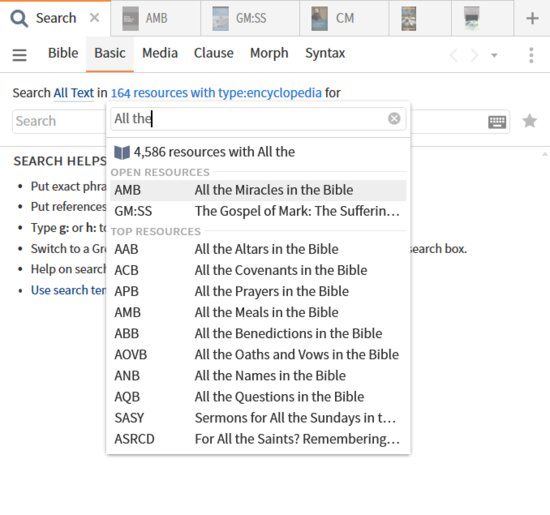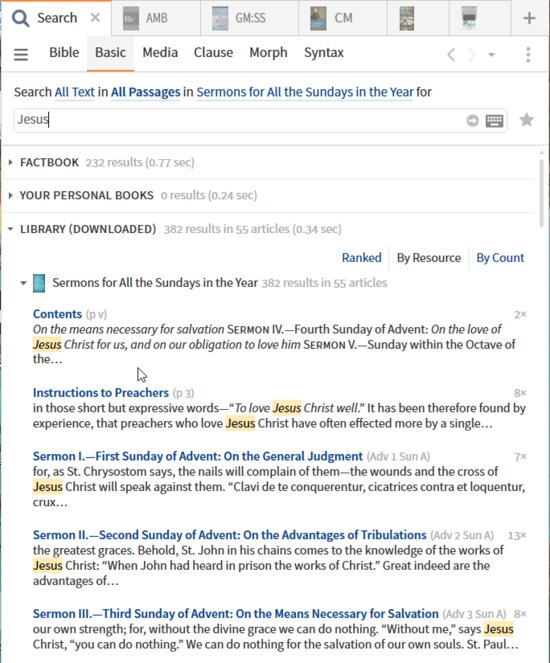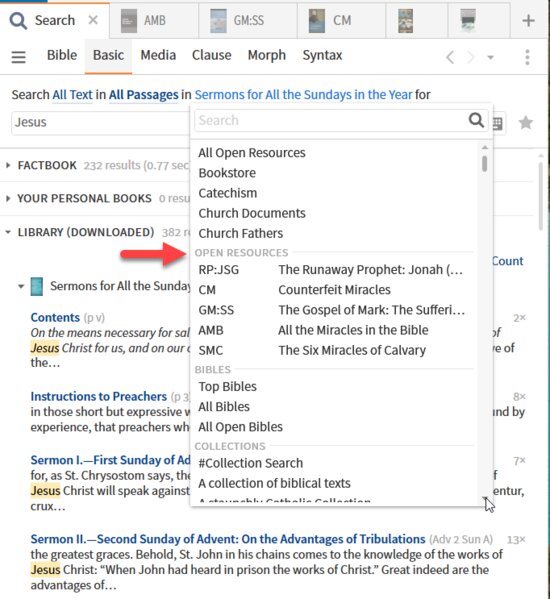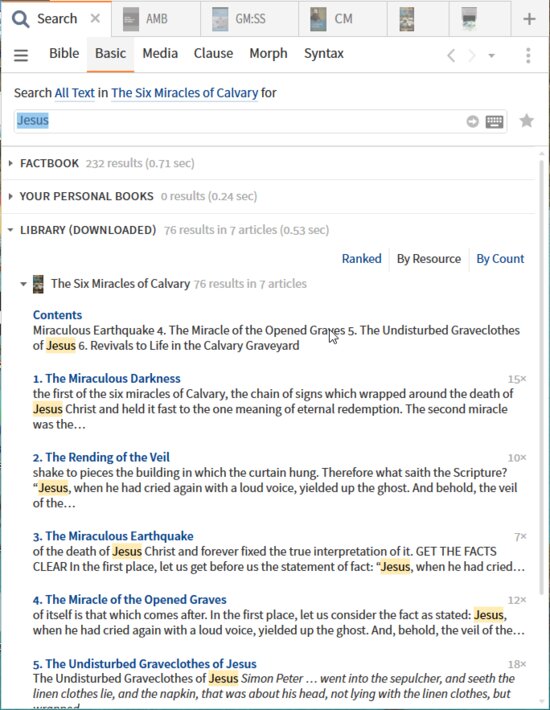Docx files for personal book: Verbum 9 part 1; Verbum 9 part 2; Verbum 9 part 3; Verbum 9 part 4; How to use the Verbum Lectionary and Missal; Verbum 8 tips 1-30; Verbum 8 tips 31-49
Reading lists: Catholic Bible Interpretation
Please be generous with your additional details, corrections, suggestions, and other feedback. This is being built in a .docx file for a PBB which will be shared periodically.
Previous post: Verbum Tip 7f Next post: Verbum Tip 7h
Resource option: Top resource
The top line of the drop down selection menu for resources is an input line, intended to allow one to find any of the resources previously described more quickly than scrolling down the list. An example is looking for the collection of doctors of the church. Entering “doctor” picks out items in the list from collections, series, and resource titles (top resources):

Top resources are simply the resources with titles that best fit the text you entered for you to select the title you wish to search.

Selecting Sermons for All the Sundays in the Year and running the search yields:

Resource option: Open resource
The open resources option simply allows one to pick a resource from a list of the open resources.

Selecting the resource The Six Miracles of Calvary and running the search:

Resource option: temporary collection
The rules for filtering the library, defining a collection, and building a temporary (on the fly) collection are a system of fields, values, and syntax similar to that for a Search but independent of it. The best documentation of it comes from Dave Hooten’s work in the wiki:
From Logos wiki:[quote]
Using the Find box to filter resources
- The Find box can help you find resources in your Library; whether on your device or not.
- First, it is advisable to be in Details view and sort your Library by Title.
- When not using Search Fields (below), Logos looks for your text in the Title, Subject and all other fields.
This method can be quicker than using Search Fields but you will have to manually scan the columns to understand the results.
- Logos finds results even if the search text is just a part of an actual word.
- for an exact match put a single word into quotation marks e.g. “sin” versus sin; where the latter will match sinner, single ...
- You may search for strings (words in “quotation marks”) to get better results.
- The wildcard * stands for any number of characters (including zero)
- Just searching for * will list your whole library, which is helpful in constructing “All but...” exclusion searches.
- The wildcard ? stands for zero or one character
- Using parentheses ( ) gives you control over how Logos understands your search text.
- Examples:
- dictionary
In the Library window, you should see several resources with “dictionary” in their Title.
But you will also see other resources which you would not consider as dictionaries because they have data somewhere that is related to a dictionary. In the next section you will learn how to use Search fields to limit your text to a specific field (column).
Try clicking on different columns in the Heading row and notice how Logos rearranges your list.
- Eric?son
This is useful if you can’t recall whether Erickson was spelt with “c” or “ck”.
Entering text in the Find box
Search Fields that you can use in the Find box
Search fields are extremely useful when you want to see a list of resources without ambiguity.
The table below shows you the Search fields which you can use in the Find box of your Library window.
Most of them are associated with the column headers in Details view:
- A Column Name in italics is a Decription for a field that does not have a column.
- Search Field is the name that you can enter in the Find box (or the Rule box of a Collection).
- Extension Syntax is the syntax you can use for an exact match on some fields.
|
Column Name
Description
|
Search Field
|
Extension Syntax
|
Example/Comment
|
|
|
|
|
|
Reading Status
|
—
|
{ReadingStatus}
|
value=Unread, New, Reading, or Finished e.g. {ReadingStatus New}
|
|
Type
|
type:
|
|
type:"bible commentary", type:bible-commentary
|
|
Title
|
title:
|
|
title:tyndale
|
|
Abbreviated Title
|
abbrev:
|
|
abbrev:TNTC
|
|
Alternate Title
|
alttitle:
|
|
|
|
My Tags
|
mytag:
|
{MyTag}
|
mytag:creation, {MyTag "Creation"}
|
|
Community Tags
|
communitytag:
|
{CommunityTag}
|
requires Show Community Tags
|
|
Combined Tags
|
tag:
|
|
same as mytag: unless Show Community Tags is set
|
|
Rating
|
myrating:
|
|
User rating (integer 1 to 5). Use 0 for unrated e.g. myrating:4, myrating:>0
|
|
Community Rating
|
communityrating:
|
|
(decimal value) Requires Show Community Ratings.
Value shown on hover in Rating column e.g. communityrating:3.3
|
|
Overall Rating
|
rating:
|
|
(integer) Same as myrating:, but it will reflect the Community Rating
if the book is unrated by the user e.g. rating:>=3
|
|
Languages
|
lang:
|
|
lang:English, lang:German
|
|
Author
|
author:
|
{Author}
|
author:"don harris", {Author "Harris, Don"}
|
|
Electronic Publication Date
|
epubdate:
|
|
epubdate:2017, epubdate:<2017
|
|
Publication Date
|
pubdate:
|
|
pubdate:2017, pubdate:>2017
|
|
Publisher
|
publisher:
|
{Publisher}
|
publisher:crossway, {Publisher “Crossway”} and {Publisher “Crossway Books”}
|
|
Series
|
series:
|
{Series}
|
series:tyndale
|
|
License
|
license:
|
|
value=Permanent, Temporary
|
|
Subjects
|
subject:
|
{SubjectGroup}
|
{SubjectGroup} is more precise, but formatting can be difficult —> see Examples
|
|
Last Updated
|
updateddate:
|
{UpdatedDate}
|
See this forum post e.g. updateddate:<greater Sept 19, 2020>.
{UpdatedDate} uses recent year, month, or day values e.g. {UpdatedDate 2m}
|
|
Date Added
|
addeddate:
|
{AddedDate}
|
Same format as Last Updated e.g. addeddate:<less Sept 19, 2020>
{AddedDate 6d} —> within 6 days of current date
|
|
Devices
|
device:
|
{Devices}
|
device:"Galaxy A5", {Devices "Galaxy A5"}.
{Devices} is more accurate
|
|
Edition
|
edition:
|
|
value=”Logos Research”, “Logos Reader”, "User Created", ebook
e.g. edition:user, edition:logos —> for either Logos edition
|
|
Collection
|
—
|
{Collection}
|
{Collection "Greek Bibles – TR"}
|
|
|
|
|
- When using SearchField: syntax
- make sure there are no spaces between the field name and the colon.
- when you enter the text to search for, make sure that there is no space after the colon e.g. title:dictionary author:henry
- enclose multiple search words in quotes, or separate them with a hyphen (with no spaces after the colon)
e.g. title:"biblical languages" or title:biblical-languages
- Quotes imposes an exact match on words:
- title:"matthew henry" will not find “Matthew Henry’s” commentary.
Use title:"matthew henry’s" or title:matthew-henry instead.
- You can use partial words and/or wildcards as a convenience, or when your quoted words are not found. For example:
- title:matt title:henry
- title:"matthew henry*"
- Examples:
- title:"holman bible"
In the Library window, you will see only the books with “Holman Bible” in the title.
“Holman Concise Bible Commentary” will be not be included, because Concise splits the words in our search term.
- title:holman title:bible
This will include “Holman Concise Bible Commentary”, because both words are in the title.
- publisher:nelson title:king
Adding title:king restricts the books published by Thomas Nelson to those with king in the Title (full and partial words).
- pubdate:>=2010
This will find all resources published in 2010 or after.
- subject:Bible.O.T.Psalms or subject:"Bible. O.T. Psalms"
They give the same result, but will include values like Psalms 1-72
- author:"Harris, Don" or author:"don harris"
They give the same result, whilst author:harris is not sufficiently unique.
- addeddate:<Oct 2018>
This will find all resources that were added to your machine in October, 2018
This is distinct from updateddate:<Oct 2018>, as these resources may have been added to your machine in October or earlier.
- When using {SearchField} syntax
- Note that this syntax is primarily intended for use in Collections, because it is much more efficient for repeated use.
- The field name should be followed by a space, and then a value that must be enclosed in double straight quotes e.g. {Publisher "Crossway"}
- The value entered must be an exact match (including punctuation) for the desired value.
For that reason, it is advisable to copy values where possible.
- If a value contains double straight quotes, they must be escaped with extra double quotes e.g. Definite "Value" ==> "Definite ""Value"""
- Multiple values can be supplied by separating them with a comma (,) e.g. {Publisher "Crossway", "Lexham Press"}
- You can use None or Any with a field e.g. {MyTag None}, {Series Any}
- Wildcards are not supported.
- Examples:
- {Series "Barnes’ Notes on the Old and New Testaments", "Wiersbe’s “Be” Series"}
It is best to copy these Series values.
Barnes has a closing curly single quote
Be has curly quotes, so it doesn’t need to be escaped.
- {SubjectGroup "Bible O.T.—Psalms"}
Note how this is derived from the value Bible. O.T. Psalms you see in Library.
Being more precise, values like Psalms 1-72 are excluded.
- {Author "Barnes, Albert"}
It has to use the value you see in the Author column as "Barnes Albert" will not work.
- {AddedDate 1y}
This will find resources added within 1 year of the current date.
Using Operators in the Find box
- You can use boolean operators like AND, OR, ANDNOT to retrieve resources.
- Operators are written in CAPS while the search expressions and fields are not case-sensitive
- AND may be written as the space character, whilst OR may be shortened by using the comma
- Negation (exclusion of results) is effected by ANDNOT, or use of the minus sign directly in front of the search expression.
- Parentheses ( ) is often necessary if you are mixing operators in your search expression.
in this case, do not use characters for operators.
The comma operator can be used inside phrases.
Examples
Barnes OR Roberts or Barnes, Roberts
either expression will find books authored by Barnes or Roberts; but
author:barnes, author:”roberts” is more precise, and will eliminate “Robertson” as an author; whilst
author:(barnes, “roberts”) is more concise.
type:bible-commentary ANDNOT author:Barnes or type:bible-commentary -author:Barnes
either expression will exclude bible commentaries authored by Barnes; whilst
* -author:Barnes will exclude all Barnes’ resources in your Library.
mytag:didache AND lang:greek or mytag:didache lang:greek
either expression will find the Greek books that you tagged with “Didache”, as opposed to the English language ones.
This tag can be applied to many “Apostolic Fathers” resources e.g. Lightfoot’s, Lake’s, ANF7.
title:"Commentary on the (old,new) testament"
this expression is equivalent to title:("Commentary on the old testament", "Commentary on the new testament").[1]
[1] Library (logos.com) 3/19/2021 11:28 PM